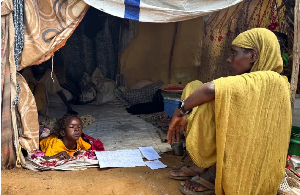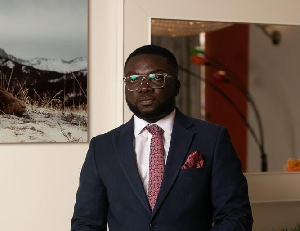By Kwame Okoampa-Ahoofe, Jr., Ph.D.
While much that is malicious and cynical has been written and said about the man, largely by his detractors and political opponents, not remarkably much has been written and/or said about the phenomenal contribution of modern Ghana’s second democratically elected leader to the development of the country’s enviable current democratic culture. The problem has been hardly one of evidentiary dearth; rather, it has almost squarely been predicated upon the carcinogenically entrenched propaganda machinery of pseudo-pan-Africanist remnants of the neo-fascist Nkrumaist project who continue to relatively have a field day in the scandalous, albeit quite successful, fabrication and dissemination of what modern Ghana’s first elected leader really was about, beyond his pan-Africanist platitudes and broad brush-strokes of stentorian rhetorical pretense to African humanism.
Well, all this is rapidly beginning to change, as Ghanaians and, indeed, Africans across the proverbial primeval continent and, in fact, around the globe mature in their experience and appreciation for constitutional democracy and the unfettered creativity and spiritual enrichment which the latter dispensation purveys. Needless to say, just as Nkrumah has been, accurately or inaccurately, conceded the foremost seat and pedestal among the ranks of African nationalists, Dr. Kofi Abrefa Busia – together with Dr. J. B. Danquah – ought to be unreservedly accorded prime seating among the ranks of ardent advocates of democracy in postcolonial Africa. In the case of the putative Doyen of Gold Coast and Ghanaian politics, Dr. J. B. Danquah, failure to do so would imply the unpardonable commission of a double-injury, since practically and historically speaking, the first president of the London-based West African Students Union (WASU) is also properly speaking, twentieth-century Africa’s first nationalist, as incontrovertibly attested by his yeomanly activities with the landmark Gold Coast Youth Conference (GCYC), beginning from 1929, and Danquah and George “Paa” Grant’s seminal establishment of the United Gold Coast Convention, the first serious attempt to unify any group of African people under a single national ideological umbrella.
Anyway, while in terms of depth and range it is rather modest, nevertheless, the small volume of documentary compilation perspicuously titled The Courage And Foresight of Busia: Great Historic And Prophetic Statements Issued by Professor K. A. Busia while in Exile (Accra, Ghana: George Boakie Publishing Company, 1969), provides the untutored and non-specialist reader with undoubtedly the most comprehensive propaedeutic appreciation of President Nkrumah’s most formidable political opponent in the post-Danquah era. And by the latter temporal reference, of course, is meant the period beginning from 1954 when the Doyen of Gold Coast and Ghanaian politics, having lost his bid to retaining his originally appointed seat in the Gold Coast Legislative Assembly to Mr. Aaron (Kofi Asante) Ofori-Atta, his own nephew, graciously bowed out of active Ghanaian politics. Predictably, however, this would not be the last time that his countrymen and women would be hearing from the Father of Modern Ghanaian Politics. With Busia having been stampeded into a European exile in 1959, in a devious and deliberate attempt to entrench Nkrumah’s dictatorial manacles on the ankles of a hitherto unsuspecting Ghanaian electorate, Danquah found himself forced to desperately deputize for the then-Parliamentary Opposition Leader in a decidedly doomed attempt at preventing the then-Prime Minister Nkrumah from “legally” relinquishing his constitutionally mandated periodic accountability of his stewardship to the august Ghanaian parliament (See Dennis Austin’s Politics in Ghana: 1946-1960).
The man who generously inducted the proverbial African Show Boy onto the modern Ghanaian political landscape would brutally and savagely pay the ultimate price, for daring to remind his former protégé that the Ghana of 1960 was, indeed, a civilized and enlightened constitutional democracy, rather than the fledgling outpost of a Soviet-type of communism. Busia would eventually vindicate both Dr. Danquah and himself, with his landslide victory and landmark election as Prime Minister of Ghana in 1969. And while his tenure would be short-lived by being toppled by the Acheampong-led putsch of January 13, 1972, nevertheless, in the long haul, it would be the democratic letter and spirit of the law to which Drs. Danquah and Busia, among a host of other equally distinguished Ghanaian citizens, devoted their lives which would triumph over and above all other ideological considerations on the postcolonial Ghanaian political landscape.
Competently compiled by Mr. H. K. Akyeampong, who also notably compiled most of the writings of Dr. Danquah, The Courage And Foresight of Busia heartily and proudly celebrates the indisputably brilliant and path-paving achievements of the great Oxbridge-educated scholar, sociologist and prime minister of his country’s Second Republic (1969-1972). Refreshingly as well, this 76-page book has an introductory note authored by the late distinguished Oxbridge-educated Ghanaian classicist and authoritative Danquah biographer Prof. L. H. Ofosu-Appiah. In the main, the book which is delectably festooned with memorable photographs capturing significant moments and aspects of its illustrious subject’s academic and political careers, details Dr. Busia’s relentless personal and moral struggle against the neo-fascist dictatorship of the Nkrumah-led Convention People’s Party (1957-1966). Published on the eve of the landmark election of the Busia-led Progress Party (PP), the direct ideological offspring of the erstwhile United Party (UP), into the democratic reins of governance in August 1969, the compiler dedicates The Courage And Foresight of Busia as follows: “This little book is respectfully dedicated to all former members of the National Executive [Committee] of the banned United Party who have rallied around Professor Busia under the banner of the Progress Party. ¶ They fought [on] the long road,/They sought to lift the Ghanaian’s heavy load,/ And now the sound of joyous music fills my ear,/ Saying: Go on! Go on! For victory is near!”
Further Akyeampong, in his Preface to the book, delineates his subject as a deep and critical thinker who envisaged Ghana’s achievement of sovereignty far and well beyond the bombastic and populist rhetoric of budding dictators like Mr. Kwame Nkrumah: “I myself got to know Professor Busia in 1952 when he became the leader of the Ghana Congress Party (GCP) which was formed at the [sic] Achimota Forest out of the rump of the United Gold Coast Convention (UGCC). It is interesting to recall that he was the only member of the Congress Party to win a seat in the 1954 General Election ¶ I remember when Professor Busia launched the Ghana Congress Party in Accra on the 4th of May 1952, he made it abundantly clear in his address that before he joined any group of people whose aim was immediate self-government[,] he would ask what they proposed to do with it, and what sort of country they wished to make of Ghana. Although his aim was to liberate Ghana from imperialism, he wanted at the same time to make sure that in addition and simultaneously there would be implanted in Ghana[,] solid foundations of a viable and vigorous democracy. ¶ From 1952 to 1957 when the struggle for self-government laboriously dragged on, Professor Busia daily warned the people of Ghana to be very careful of the politicians whose sole purpose was immediate self-government[,] regardless of the absence of civil rights and freedoms. He warned that such politicians were prepared to tell lies, to make false promises, knowing them to be false; to feed fat on the ignorance of the people, and that the immediate self-government they had in mind was one that would bring power and wealth to a few adventurers, and oppression, intimidation and hardship to many. He asked the masses to be very careful of such politicians because they were not ‘true patriots.’ He called Nkrumah and his lieutenants liars, self-seekers and swindlers. ¶ Professor Busia said all these things in his soft, inspiring voice, but the masses did not listen to him; hence our present woes. His words are always very prophetic. ¶ Strange to relate [that] the then CPP followers who were blind to truth and preferred lies to truth hurled stones and bottles at Professor Busia whenever he attended a rally of his party[,] because he dared to expose their leaders. They called him many names – the chief being that he was a nation-wrecker. But he was undaunted, or to quote the words of a writer, ‘he never lost heart or faith, and the smile of patience and tolerance seldom left his face.’ And after independence when our [lives] and [freedoms] hung by a thread[,] he carried on the struggle unremittingly until Nkrumah and his sycophants were sacked from office. ¶ Today these CPP boys[,] who usually broke up his meetings by organized hooting and stone throwing and other violent attacks are singing [the] praises of Professor Busia[,] saying in effect: ‘Busia, you told us [so].’ The stone that the builders rejected has now been made the corner stone, indeed. ¶ I have been greatly impressed with Professor Busia’s indomitable spirit. He is a mature, formidable and experienced politician who is blessed with abundant commonsense and native intelligence. He is also acknowledged throughout the world as a scholar, a sensible and responsible leader of the new Ghana nation” (vii-viii).
Even more poignantly, H. K. Akyeampong observes the imperative need for Ghanaian youths to enlighten, as well as educate, themselves about the history and deeds of those stand-out Ghanaian citizens of an earlier period who contributed immensely towards the formation and shaping of the country as, many of us have come to know it in the postcolonial era. The compiler of The Courage And Foresight of Busia is also quick to apprise the reader of the stringent impact of logistics in the politics of the Ghanaian publishing industry: “My main reason for compiling and publishing these documents at this time[,] when we are all busy with electioneering campaigns[,] is to enable the younger generation to know of Professor Busia’s manifold contributions to the political struggle through which this country has passed. Frankly, owing to the high cost of printing in Ghana, it has not been possible to include every statement he has issued during this important period in our history”(vii).
As usual, in his Introduction to The Courage And Foresight of Busia, Professor Ofosu-Appiah highlights the fact that a “viable democratic culture” is a phrase that was woefully wanting in both the vocabulary arsenal and policies of the Convention People’s Party. This neo-fascist and neocolonialist attitude towards national governance, maintains the celebrated author of The Life And Times of J. B. Danquah, would set the political direction of the country on a decidedly regressive course: “Even before they assumed power in 1951[,] the leaders of the Convention People’s Party made it plain that they did not want any opposition in the country. The violence and intimidation which the leaders sponsored were evidence enough. After independence[,] the power they obtained led the CPP to pass the Preventive Detention Act to terrorize the Parliamentary opposition and any Ghanaian who did not approve of the way the country was being run. From the documents in this collection[,] it is clear that the target of Nkrumah and his cabinet was Professor K. A. Busia, who had been their gadfly all along. The sordid deals with [Mr.] Savundra [and the London-based Camp Bird Limited] led Busia to carry out an investigation in Britain, and the guilty men felt that that was the limit. The PDA was therefore going to be used against him; and, as a prelude, his passport was to be seized. It is curious that a Cabinet could decide that a man who exposes their criminal activities is endangering the security of the state; but this was exactly what the Nkrumah Cabinet did in 1959. Events have proved Busia right. The Apaloo Commission on the Nkrumah Properties and the Azu Crabbe Commission on NADECO show conclusively that Nkrumah, Gbedemah, Botsio, Krobo Edusei and others collected bribes – the notorious 10 % - from foreigners for their party. Are we surprised that Ghana’s foreign reserves were exhausted by 1961? ¶ The Editors of the Evening News and The Ghanaian Times welcomed the Preventive Detention Act mainly because they knew it was meant for the Opposition alone. They had the support of the Party’s fanatical supporters, who found out later to their [traumatic] cost that it was meant for them, too! But before then the Party newspapers were full of revenge and regarded Prison as a University for correcting the type of ‘dangerous thoughts’ in which Busia was indulging. Busia had to leave the country because it was the only prudent [course] to take. ¶ Falsification of history, which was the special subject of the Convention People’s Party leadership, is the subject of a Press Conference which is included in this collection. During Busia’s years in exile[,] some Ghanaian patriots, who were enjoying the tyranny, used to lament that he was washing Ghana’s dirty linen abroad. What those men failed to see was that since independence, the diplomatic corps had gathered among us some of the most intelligent men and women from several countries, who always sent reports on our rulers home. Anybody who read through [the pages of] Africa Confidential would know that there were hardly any secrets in Ghana in those days, and that the foreigners knew all [of] our leaders’ weak points and [duly] played on them. That is why bribery and corruption continued unchecked till the end of the regime. That is why some foreign diplomats still back politicians with a corrupt past, because they are the people who can sell the country more easily to foreigners. Basically, the diplomacy of the rider and the ass is still being practiced by [the] East and [the] West alike in Africa, and only the simple-minded will deny this”(The Courage And Foresight of Busia ix-x).
*Kwame Okoampa-Ahoofe, Jr., Ph.D., is Associate Professor of English, Journalism and Creative Writing at Nassau Community College of the State University of New York, Garden City. He is Director of The Sintim-Aboagye Center for Politics and Culture and author of “Dr. J. B. Danquah: Architect of Modern Ghana” (iUniverse.com, 2005). E-mail: okoampaahoofe@optimum.net.
###
Opinions of Sunday, 4 March 2012
Columnist: Okoampa-Ahoofe, Kwame


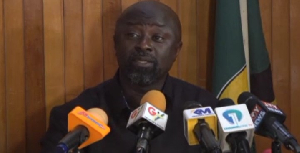

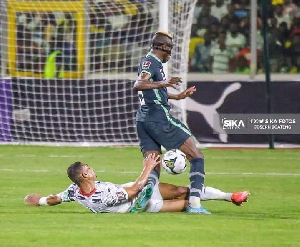

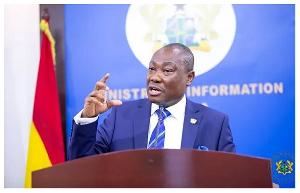

![Emmanuel Tetteh George and his wife Ruth Ewoenam [Image Credit: Manuel Photography] Emmanuel Tetteh George and his wife Ruth Ewoenam [Image Credit: Manuel Photography]](https://cdn.ghanaweb.com/imagelib/pics/943/94388192.295.jpg)

